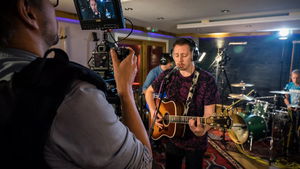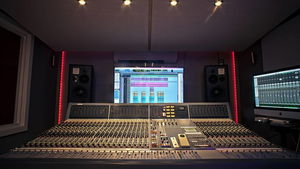
Getting Started as a Jazz Vocalist
Been thinking about becoming a jazz vocalist, but don't know where to start? Interested in doing ‘function’ gigs and signing up with an agency such as Alive Network? Here are some helpful tips and advice on how to get started.
1. Familiarise Yourself With The Jazz Repertoire
The best place to start is to familiarise yourself with the jazz repertoire. The songs of this genre are generally referred to as 'Standards', not 'cover' songs. To sing a jazz standard takes more than simply singing the song, as with a ‘cover’ version. Singing a standard involves getting to know the story behind the song, and putting one’s own stamp on it via an interpretation. Well known ‘standards’ are documented in a series of jazz books or volumes, known as ‘Real Books’, comprising sheet music and/or charts, which are available to buy online or in a local music store.
2. Add Popular ‘Function Gig’ Songs
Once you have built up a sizable repertoire, you should aim to include songs that are popular at private events, such as those you would be booked for via an agency like as Alive Network. The most obvious events being weddings and birthdays. These are generally referred to as ‘function’ gigs. Once a jazz singer gains some experience performing, or getting familiar with a jazz repertoire by rehearsing with a musician or band, specific songs are identified as being the most popular among the general public. For example, ‘Summertime’, ‘Fly Me to the Moon’ and ‘Moondance’ to name a few. However, in my view, I think it is just as important to sing songs that you genuinely like and have a connection with. At function gigs, requests will be made by guests at the event, and sometimes you may have to sing a song that you are not that fond of, but may be a favourite for a client. It will also be helpful to look at other jazz vocalists’ profiles who are registered with Alive Network, to see what songs they have listed on their pages, and determine the common popular songs among them.
3. Get Singing Lessons
It is useful to gain tuition in jazz singing, while working on building up a repertoire. This can be done in a variety of ways, either through attending an evening class at an adult education college, for example Morley College in London; or gaining private tuition with an experienced jazz vocalist. There are often summer residential jazz courses run by well-known and established jazz vocalists and instrumentalists (based in the UK), who put together a specific programme for aspiring jazz musicians. These often take place in London and/or in a picturesque part of France, and take place over a week. These courses, although they are short, can be quite intensive but enjoyable, and there is often the opportunity to perform each evening with the tutors. Go to http://www.jazzinlondon.net/ to see specific courses listed at the back of the newsletter. If you are interested in taking it a step further i.e. studying jazz at a music college, there are several renowned colleges in London and also nationally, notably the Guildhall School of Music (based at the Barbican) and Leeds College of Music, to name a couple.
4. Perform At Open Mic Nights
In order to gain more performance experience and get yourself ‘out there’, it is worthwhile seeking out ‘open mic’ sessions in your city. There are many opportunities like this nationally, and not only does it help in dealing with nerves and getting a feel for performing in front of an audience; you can also learn from other vocalists and get to know other local musicians. It is through such events that a vocalist can get to network and build up a pool of musicians that you could potentially work with in the future. It is important to note, that if you do attend an ‘open mic’, you should have a clear chart for the musicians to read. However, in a lot of cases, if they are jazz musicians they will know a lot of standards, and you should have a few songs at the ready to present to them in your key. The latter is very important and saves time.
5. Build Up A List Of Previous Client Testimonials
Before considering registering with an agency like Alive Network in order to get work, ideally good progress must be made with the advice outlined in points 1 to 4 above. This should also include some experience in performing, even if the gigs have been unpaid. Even better, if you have experience of doing several function or private gigs, it is important to get some feedback from the client, perhaps in a follow-up email to them. It is more than likely that your gig has been a positive experience for them, and you can then quote them as a reference in gaining future work. These quotes can also be documented on your profile page with Alive Network.
6. Collate A Pack Of Promo Materials
More specifically, there are several items that you will need to submit to Alive Network before you are considered eligible by the agency. These include the following: firstly a demo of jazz standards, ideally 3+ high quality audio tracks. These can be recorded either in a professional studio or if you are on a budget, you could ask some musicians you know if anyone has home recording equipment. Many musicians nowadays are setting up their own studios at home, and producing very good quality recordings, thus saving them a lot of money. You could offer them a reasonable fee for their time and expertise, and invite them to play with you on the recording.
Secondly, you will need some good quality, high-res photographs for your profile page. Again this is something that could be done by a friend or a professional photographer, although the latter will cost more obviously, but you usually get what you pay for! It’s a matter of asking around and perhaps if you are lucky, getting photos done by a photographer who is starting out in their career, in order to keep costs down. Alternatively, if you already have some good photos from a previous performance or private event you have done in recent times, these can certainly be posted on your page. My personal experience of Alive Network, is that a combination of studio shots and actual performance shots are preferred for the profile page, as this shows the client that a) you are professional and care about your image and b) you have experience in performing at events of this nature and potential clients can see you ‘in action’ so to speak.
Other important information needed for your profile includes a biography, outlining your experience to date; and the prices that you offer to perform at, whether it be as a duo, a trio or a quartet, or an even bigger ensemble. There are vocalists that will work with backing tracks as accompaniment, and in many cases clients will request this. However, my preference is to perform with at least one musician, so as to provide the proper ‘live’ experience. Again, it is worth looking at other vocalists’ profile pages to see what they offer for different line-ups. Through time you will be able to determine this yourself based on your own experiences, and in some cases negotiate a deal with the client based on his or her requirements. The latter is particularly prevalent today in the current economic climate, with the squeeze on peoples’ incomes. However with Alive Network, generally the pricing the client sees on your profile, is what you will go out for unless you make amendments to your page.
Lastly, it is worth investing in a PA system, as you will often be asked to provide this on gigs. It depends of course where the performance will take place, and whether a PA is already provided at the venue; but in most cases the musician will have to provide this. This will also be the case in terms of travelling to the venue. Depending on where the gig is, musicians will need their own transport, whether musicians travel together or in separate vehicles.
Written by Orla Murphy of Golden Jazz - A voice possessing a unique, rich, and soulful sound with a fiery, bluesy quality






